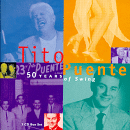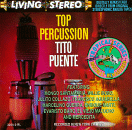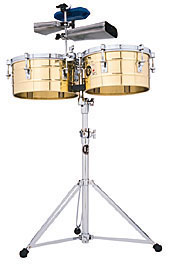Tito
Puente Recommended Listening
It's
really impossible to name just one or two albums, since Sr.
Puente made over a hundred, but these are a great starting
point.

50 Years of Swing
a 3-CD set covering 50 songs.
A great introduction to Puente's music.
listen
to Tito Play on this cut, Tigimo+2, featuring Tito, Giovanni
Hidalgo, & Mongo Santamaria
 Top Percussion (1992,
click song titles to listen to song samples)
Top Percussion (1992,
click song titles to listen to song samples)
"Simply put, this date
is a once-in-a-lifetime summit meeting of Cuban and Puerto
Rican master percussionists of Afro-Cuban music: Mongo Santamaria,
Franciso Aguabella, Willie Bobo, and Julito Collazo. Together,
these masters explore the endless folkloric inventions and
dimensions of Cuba's complex drum music-- from the Afrocentric
bembe/Santeria syncopations of
"Eleguara" and
"Obatala Yeza" to the clave-coded "Mon
Ti," "Four by Two," and "Conga Alegre."
The "hit" is the cool cha-cha "Ti-Mon-Bo,"
named for Tito, Mongo, and Bobo. Like their African musical
forefathers, Tito Puente and his compatriots have delivered
an ancestral drum message that has danced and entranced musicians
and listeners for years." --Eugene Holley Jr., Amazon
Reviews
|
 Tito
Puente was born in New York City in 1923 to a family of Puerto
Rican descent, planning to become a dancer before an ankle injury
channeled his creative energies into music. By the time he was 13,
Puente was drumming for Ramon Olivero's band, later formally studying
composition at the Julliard and New York Schools of Music. Combining
traditional Latin-American music with North American jazz, Puente
formed his own band in his mid-20s, the Picadilly Boys,
which later evolved into a full orchestra. Tito
Puente was born in New York City in 1923 to a family of Puerto
Rican descent, planning to become a dancer before an ankle injury
channeled his creative energies into music. By the time he was 13,
Puente was drumming for Ramon Olivero's band, later formally studying
composition at the Julliard and New York Schools of Music. Combining
traditional Latin-American music with North American jazz, Puente
formed his own band in his mid-20s, the Picadilly Boys,
which later evolved into a full orchestra.
 Over
the next several decades the prolific Puente released scores
of albums on the Tico and RCA Victor labels, popularizing Latin
music among Anglo audiences during the 1950s. A multi-talented musician,
Puente freely switched between saxophone, conga drums, bongos and
vibraphones, composing, arranging, conducting, and performing with
his orchestra. The group freely switched between cha-cha, mambo,
bossa nova, salsa, jazz and pop, demonstrating Puente's genius for
cross-cultural and stylistic fusion. Puente, known was
"The King of the Mambo," continued performing and
recording throughout the '60s, gaining new fans during the close
of the decade thanks to Santana's cover of the Puente classic
"Oye Como Va." His band continued to evolve during
the 1970s, and in the early 1980s Puente moved to the more
jazz-oriented Concord Picante label. He recorded his 100th album,
The Mambo King, in 1991, marked by a massive tribute performance
in Los Angeles. Sr. Puente died on June 1, 2000. Over
the next several decades the prolific Puente released scores
of albums on the Tico and RCA Victor labels, popularizing Latin
music among Anglo audiences during the 1950s. A multi-talented musician,
Puente freely switched between saxophone, conga drums, bongos and
vibraphones, composing, arranging, conducting, and performing with
his orchestra. The group freely switched between cha-cha, mambo,
bossa nova, salsa, jazz and pop, demonstrating Puente's genius for
cross-cultural and stylistic fusion. Puente, known was
"The King of the Mambo," continued performing and
recording throughout the '60s, gaining new fans during the close
of the decade thanks to Santana's cover of the Puente classic
"Oye Como Va." His band continued to evolve during
the 1970s, and in the early 1980s Puente moved to the more
jazz-oriented Concord Picante label. He recorded his 100th album,
The Mambo King, in 1991, marked by a massive tribute performance
in Los Angeles. Sr. Puente died on June 1, 2000.
Here's
a link to the LP Tito Puente tribute page
AP
video: Puente honored
at New York's Latin Quarter
club shortly before his death
(Requires free
RealPlayer)
|